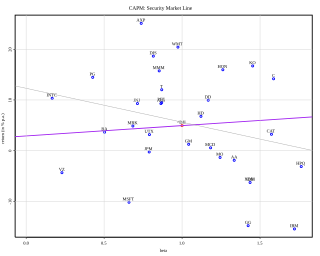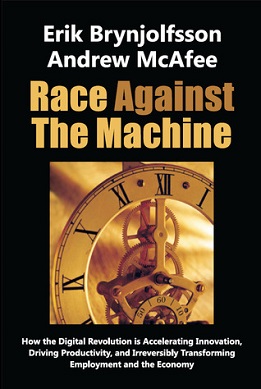Related Research Articles

Finance, also known as financial economics, is the study and discipline of money, currency and capital assets. It is related with, but not synonymous with economics, the study of production, distribution, and consumption of money, assets, goods and services. Finance activities take place in financial systems at various scopes, thus the field can be roughly divided into personal, corporate, and public finance.

In finance, the capital asset pricing model (CAPM) is a model used to determine a theoretically appropriate required rate of return of an asset, to make decisions about adding assets to a well-diversified portfolio.

Personal finance is the financial management which an individual or a family unit performs to budget, save, and spend monetary resources over time, taking into account various financial risks and future life events.
In finance, the beta is a measure of how an individual asset moves when the overall stock market increases or decreases. Thus, beta is a useful measure of the contribution of an individual asset to the risk of the market portfolio when it is added in small quantity. Thus, beta is referred to as an asset's non-diversifiable risk, its systematic risk, market risk, or hedge ratio. Beta is not a measure of idiosyncratic risk.

Value investing is an investment paradigm that involves buying securities that appear underpriced by some form of fundamental analysis. The various forms of value investing derive from the investment philosophy first taught by Benjamin Graham and David Dodd at Columbia Business School in 1928, and subsequently developed in their 1934 text Security Analysis.
Financial risk management is the practice of protecting economic value in a firm by using financial instruments to manage exposure to financial risk - principally operational risk, credit risk and market risk, with more specific variants as listed aside. As for risk management more generally, financial risk management requires identifying its sources, measuring it, and the plans to address them. See Finance § Risk management.
Passive income is a type of unearned income that is acquired automatically with minimal labor to earn or maintain. It is often combined with another source of income, such as a side hustle. In the United States, the IRS divides income into three categories: active income, passive income, and portfolio income. Passive income, as an acquired income, is the result of capital growth or is related to the tax deduction mechanism, and is taxable.
A private-equity fund is a collective investment scheme used for making investments in various equity securities according to one of the investment strategies associated with private equity. Private equity funds are typically limited partnerships with a fixed term of 10 years. At inception, institutional investors make an unfunded commitment to the limited partnership, which is then drawn over the term of the fund. From the investors' point of view, funds can be traditional or asymmetric.

In finance, diversification is the process of allocating capital in a way that reduces the exposure to any one particular asset or risk. A common path towards diversification is to reduce risk or volatility by investing in a variety of assets. If asset prices do not change in perfect synchrony, a diversified portfolio will have less variance than the weighted average variance of its constituent assets, and often less volatility than the least volatile of its constituents.

Gies College of Business is the business school of the University of Illinois Urbana-Champaign, a public research university in Champaign, Illinois. The college offers undergraduate program, masters programs, and a PhD program. The college and its Department of Accountancy are separately accredited by AACSB International.
Zvi Bodie is an American economist, author and professor. He was the Norman and Adele Barron Professor of Management at Boston University, teaching finance at Questrom for 43 years before retiring in 2015. His textbook, Investments, (with Kane and Marcus) is the market leader and is used in the certification programs of the CFA Institute and the Society of Actuaries. Bodie's work has centered on pension finance and investment strategy. He continues to do consulting work and media interviews.

An alternative investment is an investment in any asset class excluding stocks, bonds, and cash. The term is a relatively loose one and includes tangible assets such as precious metals, collectibles and some financial assets such as real estate, commodities, private equity, distressed securities, hedge funds, exchange funds, carbon credits, venture capital, film production, financial derivatives, cryptocurrencies, non-fungible tokens, and tax receivable agreements. Investments in real estate, forestry and shipping are also often termed "alternative" despite the ancient use of such real assets to enhance and preserve wealth. Alternative investments are to be contrasted with traditional investments.
The Home bias puzzle is the term given to describe the fact that individuals and institutions in most countries hold only modest amounts of foreign equity, and tend to strongly favor company stock from their home nation. This finding is regarded as puzzling, since observed returns on national equity portfolios suggest substantial benefits from international diversification. Maurice Obstfeld and Kenneth Rogoff identified this as one of the six major puzzles in international macroeconomics.
An angel investor is an individual who provides capital for a business or businesses start-up, usually in exchange for convertible debt or ownership equity. Angel investors usually give support to start-ups at the initial moments and when most investors are not prepared to back them. In a survey of 150 founders conducted by Wilbur Labs, about 70% of entrepreneurs will face potential business failure, and nearly 66% will face this potential failure within 25 months of launching their company. A small but increasing number of angel investors invest online through equity crowdfunding or organize themselves into angel groups or angel networks to share investment capital, as well as to provide advice to their portfolio companies. Over the last 50 years, the number of angel investors has greatly increased.
Jeffrey Robert Brown is the dean of the Gies College of Business of the University of Illinois at Urbana-Champaign. Previously he was the William G. Karnes Professor in the Department of Finance and the Director of the Center for Business and Public Policy. He serves as a Research Associate at the National Bureau of Economic Research and as Associate Director of the NBER Retirement Research Center. Since 2009 he has served as a Trustee for TIAA, the operating company of TIAA-CREF. From October 2006 through September 2008, he served as a member of the Social Security Advisory Board. He served as a Senior Economist with the President's Council of Economic Advisers from 2001 to 2002. He earned a Ph.D. in economics from MIT, a Masters in Public Policy from Harvard Kennedy School, and a B.A. from Miami University.
Jean-Marie Eveillard is a French international investor who currently serves as the senior investment adviser to First Eagle Funds. Eveillard, who served more than a quarter century as a portfolio manager, was co-honored in 2001 by Morningstar, Inc. as "Stock Manager of the Year" and was a finalist for their 2009 "fund manager of the decade award for non-U.S. stocks". In 2003, the group gave him a "Fund Manager Lifetime Achievement" award.

Race Against the Machine is a non-fiction book from 2011 by Erik Brynjolfsson and Andrew McAfee about the interaction of digital technology, employment and organization. The full title of the book is: Race Against the Machine: How the Digital Revolution Is Accelerating Innovation, Driving Productivity, and Irreversibly Transforming Employment and the Economy.
Jeremy James Siegel is the Russell E. Palmer Professor of Finance at the Wharton School of the University of Pennsylvania in Philadelphia, Pennsylvania. Siegel comments extensively on the economy and financial markets. He appears regularly on networks including CNN, CNBC and NPR, and writes regular columns for Kiplinger's Personal Finance and Yahoo! Finance. Siegel's paradox is named after him.
David Thesmar is a French economist who works as Franco Modigliani Professor Financial Economics at the MIT Sloan School of Management. His research interests include corporate finance, financial intermediation, entrepreneurship and behavioural economics. In 2007, he was awarded the Prize of the Best Young Economist of France.
Henrik Cronqvist is the Robert J. and Carolyn A. Waltos Dean and Professor of Economics of the George L. Argyros School of Business and Economics at Chapman University in Orange, California, a position he has held since August 2022. He previously served as a professor of finance, Bank of America scholar, and vice dean for faculty and research at the University of Miami School of Business, where he conducted interdisciplinary research and taught finance and management courses at both undergraduate and graduate levels.
References
- 1 2 3 "Scott Weisbenner – William G. Karnes Professor in Mergers and Acquisitions". Gies College of Business. Retrieved September 29, 2022.
- ↑ Byrne, John (December 7, 2021). "Dean Of The Year: Jeffrey Brown Of Gies College Of Business". finance.yahoo.com. Retrieved September 30, 2022.
- ↑ Webber, David H. (2012). "The Plight of the Individual Investor". Northwestern University Law Review. 106: 178. Retrieved November 21, 2019.
- ↑ Dimmock, Stephen G.; Huang, Jiekun; Weisbenner, Scott J. (September 1, 2022). "Give Me Your Tired, Your Poor, Your High-Skilled Labor: H-1B Lottery Outcomes and Entrepreneurial Success". Management Science. 68 (9): 6950–6970. doi:10.1287/mnsc.2021.4152. ISSN 0025-1909.